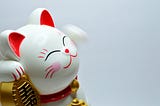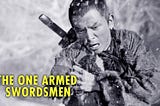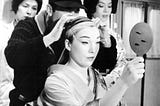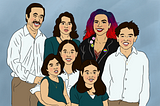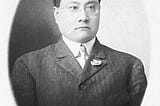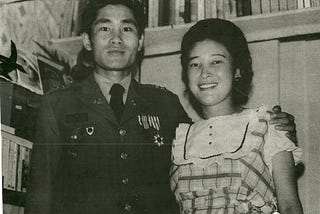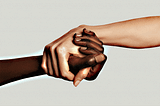"Maintaining an American identity while suppressing my Asian heritage was akin to writing with my opposite hand. The result was messy, like the time when I had to inform my first-grade teacher I had a bloody nose but in the frenzy spoke in Cantonese, much to my embarrassment and my classmates’ confusion."
"I know that technically, I am not lying when I say that I’m Vietnamese. But still, I feel like a fraud when I do. Sure, the last name I inherited from my dad is Vietnamese, but the most Vietnamese things I’ve done in my life are eat pho a few dozen times and eat my dad’s Vietnamese-style pork chops (they are delicious-ass pork chops though)."
"We’re shaped by all of the experiences we’ve had in our lives that make us unique, but it’s important to be aware of what we want to keep and strengthen, and what we want to let go of—in order to improve ourselves."
"In my halting Mandarin I told [Jimmy Wang Yu] he was was my hero and that he was the greatest movie star who ever lived. He laughed, patted me on the shoulder. We took a picture, which has since been lost. He told me to believe in myself and to live without fear. I always believed that our meeting was a moment of destiny."
"As the first Asian American woman pilot, Katherine Cheung’s main focus was to break the tradition of quiet Asian girls and teach them to fly instead."
"One day, maybe we will routinely see Asian romantic leads in blockbuster Hollywood movies that aren’t made up of all-Asian casts about insanely wealthy people. Still, it’s a start."
"YouTube, with channels like Wong Fu, Nigahiga, and Community Channel, made up the representation we longed to see on television: funny, talented, beautiful Asian people making hilarious, moving videos about… anything."
"Excavating this history can be painful. But as disturbing as these images are, they serve a purpose. No good will come of relegating yellowface to the dustbins of history when we’re still living with its consequences today."
"I wish I had started asking questions earlier, but I’m glad I know more about his journey and how his early life influenced his later years. Since I am an only child, it is up to me to preserve this history."
"Should I credit King of the Hill for showing me that I could crawl out from under my family-sized invisibility cloak to talk about what it’s like to live in a Laotian refugee family and growing up Hmong American? I feel like I should."
"Today’s Chinese Restaurant not only represented a means for economic opportunity, but also a means to deepen kinship for the family. We ate meals together and sometimes closed the restaurant early to hold family birthday parties. With a kitchen within reach, my uncles did not hesitate to bring out their best dishes to make sure everyone’s bellies were happy and full. (Once, however, we did order pizza.)"
"It was Ke Huy Quan’s speech and energy early in the show that did it for me. Holding back tears, he said, 'My mom is 84 years old and she is at home watching. Mom, I just won an Oscar! My journey started on a boat. I spent a year in a refugee camp. And somewhere I ended up here on Hollywood’s biggest stage.'"
"At its core, BEEF is a story about the tragedy of invisibility. Its most ostentatious hijinks arise over false identity and the grotesque consequences of hiding one’s truth."
"Sun Yatsen appointed my grandfather to edit San Francisco Chinatown’s revolutionary newspaper, Ta Tung Daily. The paper’s agenda was to raise funds for rebel action from overseas Chinese — including the journeymen who had come to seek their fortune on 'Gold Mountain' and wound up doing laundry and building railroads..."
"The officer threatened my grandfather as the soldiers stood around, unsure about what might happen. My mother recalls that she felt her whole family would be massacred in that moment. Finally, the officer ordered his men to leave."
"Though May in the U.S. is 'Asian American and Pacific Islander Heritage Month,' those words encompass an enormous range of experiences and histories. It can be easy to gloss over those nuances in favor of a monolithic narrative — but AAPI experiences are not singular, and true understanding comes from tuning into the details."
"The movie is an immigrant drama masquerading as a multiverse-jumping flick"
"As I reclaim these experiences and unlearn so many of the toxic behaviors that got me through those times, I often think about the concept of laughter and whiteness. I think about all the groups of friends that laugh together, not knowing that their one friend is climbing back from the Sunken Place to laugh alongside them."
"She used a can of hairspray a day, sprayed until her hair stood up pompadour, like Marilyn Monroe, and strong enough to withstand biblical hurricanes. She never stepped out of her house without the proper primping of her hair.
When Daniel, my younger brother, became more environmentally conscious after a year in college, he warned her that her immoderate use of hairspray was destroying the ozone layer. She smiled, made a visor out of her left hand and sprayed until there was a thick halo around her, forcing Daniel and me to dash out of the room coughing."
"We are treated as a monolithic group, despite comprising more than 19 groups speaking over 38 languages [...] The AAPI experience in America is wide-ranging and the demographic data disproves the model minority myth."


